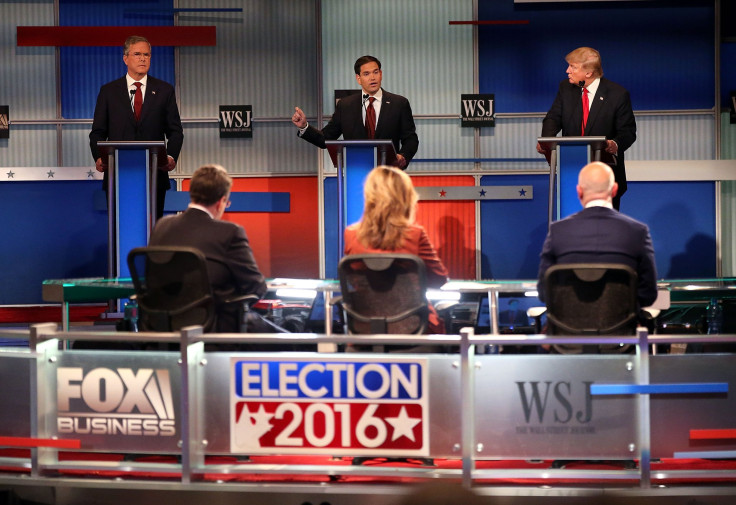GOP Candidates Debate Immigration Reform: Trump, Cruz Fight Bush, Kasich On Deporting Undocumented Immigrants

Immigration was, as always, a divisive topic during Tuesday night's Republican primary debate. But this time around, it seemed to divide the candidates themselves. Two categories emerged: those who proposed mass deportation and those who advocated for a path to citizenship.
Front-runner Donald Trump got the discussion started when he responded to a question about a federal appeals court's Monday decision to uphold an injunction blocking President Barack Obama's 2014 executive order that would give temporary legal status to about 5 million undocumented immigrants living in the United States. Trump said he was happy because immigration was hurting the nation economically and went on to repeat his proposal of building a wall along the border of Mexico.
"You will have to send people out. We’re a country of laws. We either have a country or we don’t have a country," he said, referencing former President Dwight Eisenhower's "Operation Wetback," which deported 1.3 million Mexicans in the 1950s. "They will have to go out and hopefully they get back, but we have no choice."
Texas Sen. Ted Cruz seemed to take Trump's side, though he briefly summarized his personal history with the issue. His father was an immigrant from Cuba, but Cruz said the U.S. needed to "embrace legal immigration while believing in the rule of law."
"If Republicans join Democrats as the party of amnesty, we will lose," he added. "Every sovereign nation secures its borders, and it is not compassionate to say we’re not going to enforce the laws and we’re going to drive down the wages for millions of hard-working men and women. That is abandoning the working men and women."
On the other side of the argument were Ohio Gov. John Kasich and former Florida Gov. Jeb Bush, whose wife emigrated to the U.S. from Mexico after she met him. Kasich said he agreed that the U.S. should control its borders but it was unrealistic to think the government could immediately deport all immigrants.
"If people think that we are going to ship 11 million people who are law-abiding, who are in this country and somehow pick them up at their house and ship them ... to Mexico, think about the families? Think about the children," Kasich said. "If they have been law-abiding, they pay a penalty. They get to stay. We protect the wall. Anybody else comes over, they go back, but for the 11 million people, come on, folks."
Bush said something similar when it was his chance to speak, arguing that sending back millions of immigrants was "just not possible." The candidate, who has previously proposed creating a path to citizenship for immigrants, continued: "It’s not embracing American values. And it would tear communities apart. And it would send a signal that we’re not the kind of country that we know America is."
Trump was in first place before the Tuesday night debate with the backing of 28.3 percent of likely GOP primary voters, according to the HuffPost Pollster. Retired neurosurgeon Ben Carson trailed him by about 8 percentage points, followed by Florida Sen. Marco Rubio (11.6 percent), Cruz (9.4 percent) and Bush (6.2 percent), in that order. They were joined by Kentucky Sen. Rand Paul, Kasich and former Hewlett-Packard CEO Carly Fiorina for the main debate at 9 p.m.
Louisiana Gov. Bobby Jindal, former Arkansas Gov. Mike Huckabee and New Jersey Gov. Chris Christie -- participated in the "kiddie table" event at 7 p.m. Both debates took place at the Milwaukee Theater and were sponsored by Fox Business and the Wall Street Journal.
Looking forward, the next GOP debate was set for Dec. 15. A Democratic debate was scheduled for Saturday, followed by events involving both parties in January, February and March.
© Copyright IBTimes 2025. All rights reserved.






















